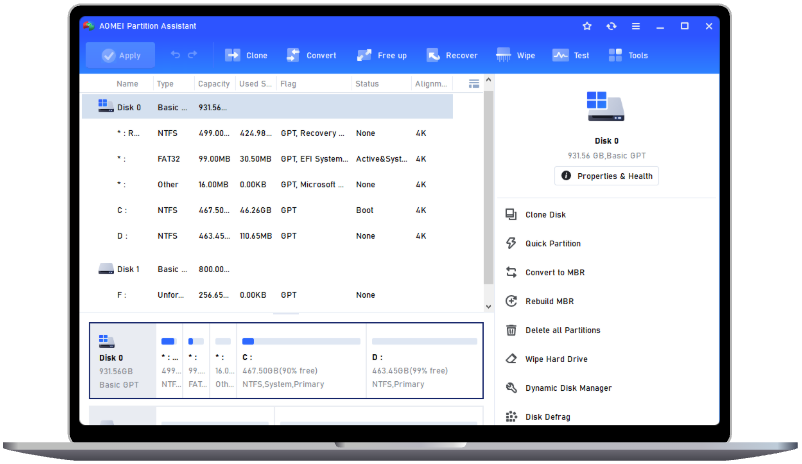Where Are Steam Games Stored? 3 Easy Ways to Find Them
This article mainly answers the following question: Where are Steam games stored? It also provides detailed guidance on how to change or move your Steam save files location on Windows PCs.
Where are Steam games stored?
Steam installs games in different locations depending on the operating system you're using, which can be confusing for newcomers. So, where exactly does Steam save your games, and how can you find or move them to a different drive? Let’s break down the specifics for Windows, macOS, and Linux.
❅Windows: By default, Steam stores game files in the "steamapps\common" folder. Here, you’ll find individual game folders, each containing all the necessary files.
>>For 64-bit systems, it’s located in C:\Program Files (x86)\Steam\steamapps\common
>>For 32-bit systems, it's in C:\Program Files\Steam\steamapps\common
❅ macOS: On a Mac, Steam installs games in the /Users/YourUsername/Library/Application Support/Steam/SteamApps/common directory.
❅ Linux: For Linux users, the default game installation path is ~/.steam/steam/SteamApps/common/.
Knowing these locations helps you easily locate or move your games to a different drive if needed.
How to find Steam save files?
Now that you're familiar with where Steam installs games, let's focus on how to find your Steam save files. In the following sections, we'll outline two simple methods to access these files. This knowledge is crucial for backing up game progress, transferring data, and troubleshooting any issues that may arise.
Method 1. Find Steam games via File Explorer/Finder
If you haven’t changed the default installation path for Steam games on Windows, accessing your game files is simple through File Explorer. Here’s how to locate them:
Step 1. Open File Explorer by pressing WIN + E on your keyboard.
Step 2. In the navigation bar, paste this path: C:\Program Files (x86)\Steam\steamapps\common.
Step 3. Inside the "common" folder, you'll find individual folders for each Steam game. Browse through the list to locate the game files you need.
Step 4. This method allows for quick access to your Steam games without any complicated steps.
Method 2. Find Steam games via Steam Library
If you've chosen a custom location for your Steam games rather than using the default path, you can still locate them through the Steam Library folder. This folder stores all your downloaded and installed games. Here’s how to find your Steam games via the Steam Library:
Step 1. Press the Windows key, type "steam", and hit Enter to open the Steam desktop app.
Step 2. Click the Steam option at the top-left corner and select Settings.
Step 3. In the Settings menu, click the Downloads tab on the left. Under Content Libraries, select Steam Library Folders.
Step 4. In the Storage Manager, choose the drive where your games are stored. Click the gear icon and select Browse Folder. A new interface will appear showing all your Steam library folders.
Method 3. Find Steam games via Steam Local Files
Another straightforward method to find your Steam games is by using the Local Files tab within the Steam app. Here’s how to do it:
Step 1. Open the Steam application on your computer.
Step 2. Click the Library tab at the top of the window.
Step 3. Right-click on the game you want to locate, then select Properties.
Step 4. In the Properties window, navigate to the LOCAL FILES tab and click BROWSE LOCAL FILES....This will open the folder containing the game files, allowing you to access them directly.
How to change Steam game location
Relocating your Steam game installations to a different drive or folder can help optimize your storage space. Here’s how to change the Steam game location using the Storage Manager on Windows:
Step 1. Open Steam on your computer, click Steam in the top menu, and select Settings.
Step 2. In the Settings menu, go to Downloads and click on Steam Library Folders. This will open the Storage Manager.
Step 3. Click the Plus (+) button next to the storage disk and choose the location where you want to move your games.
Step 4. The new drive or folder will appear in the Storage Manager. Select it, then click the three dots next to it and choose Make Default from the drop-down menu.
How to move stored Steam games in Windows PCs
If your drive is running out of space, you can move your entire Steam installation and games to another drive. Here’s a step-by-step guide on how to do it:
Step 1. Log out and exit Steam completely.
Step 2. Open File Explorer and navigate to the folder where Steam is installed.
Step 3. Delete all files and folders, except for the SteamApps and Userdata folders, as well as the Steam.exe file. It’s highly recommended to back up the SteamApps and Userdata folders before deleting anything.
Step 4. Cut the entire Steam folder and paste it into a new location, such as D:\Games\Steam.
Step 5. Launch Steam again. It will briefly update, and then you’ll be good to go.
Step 6. From now on, all new game content will be downloaded to the new folder (D:\Games\Steam\Steamapps).
Step 7. This process allows you to free up space on your primary drive while keeping your games and settings intact.
The APP Mover feature in AOMEI Partition Assistant is a powerful tool that allows you to easily move applications, including Steam games, between different drives or partitions on your Windows PC. This can be particularly useful if you're running out of space on your primary drive (usually the C: drive) and want to free up storage by relocating large files like games, applications, or software.
Using AOMEI Partition Assistant makes this process much simpler, especially when dealing with larger games or moving them to an external hard drive.
Step 1. Install and run AOMEI Partition Assistant, click "Free up” then select the “App Mover” function.
Step 2. In the new window, you will see all details about the disks, the number and size of installed programs on every partition will also be displayed. Select one partition that you want to move games from and click "Next".
Step 3. Choose games or programs you want to move and select the target location, then click "Move”.
Step 4. In the new pop-up window, you need to confirm forcibly closing running applications when moving starts. Click "OK" to begin the process.
Conclusion
Knowing where Steam stores your games on Windows helps you easily locate and manage them. You can find game files through File Explorer, Steam Library, or Steam Local Files. If you're running low on space, Steam lets you change the installation location. Additionally, using tools like AOMEI Partition Assistant's APP Mover feature simplifies moving large games to different drives, freeing up valuable storage. These methods ensure a smoother gaming experience without the need for reinstalling games, keeping your setup organized and efficient.


